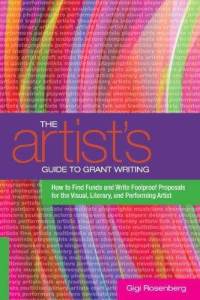
It doesn’t occur to most writers that there is “free” money—from government and nonprofit foundations—that is available to support creative projects and professional development. However, it requires writing grants, and it’s not a skill or experience that many people have. If it’s something you’re curious about, here’s a primer.
Before You Consider Applying for a Grant
- You should be actively writing and publishing. You don’t need a remarkable track record, but you can’t expect to get money unless you have work to show. Writing can’t appear as a pleasant hobby—you should be able to demonstrate it’s a serious pursuit.
- You should develop a vision for how a grant will benefit you at this point in your career. In her book, The Artist’s Guide to Grant Writing, Gigi Rosenberg says, “The grant writing process is a way to find your own answers to the big questions about your next project. … It compels you not only to articulate what kind of art you make but also why and how you make it.” Meaning this: Write a grant to better understand where you want to go next, and how you’ll get there. That way, if you get rejected, the process will be meaningful in clarifying where you’re headed.
Researching Grants
Here are some of the best resources to get started.
- Foundation Center
- Mira’s List
- NYFA Source
- Your state or regional arts council
- Poets & Writers (contests, awards, and grants)
- Funds for Writers
- Try Google with keywords pertaining to your situation, e.g., “Jewish women grant”
When attempting to get your first grant, (1) start local/regional, which means apply for local/regional arts council grants first, and (2) ask for a small amount. A possible first request might involve asking for several hundred dollars to attend a workshop, retreat, or career-building event.
5 Essentials for a Successful Grant
- Be absolutely clear about what you want and why. Your project description should express your goals clearly, describe what your project entails, and what you need to complete it. You should tell a specific story about you and your project, and why it is essential to your career at this moment in time.
- Write the grant as if it will happen, and with a positive attitude. You shouldn’t write the grant in “hoping” or “trying” mode. Write the grant as if everything you’re describing will happen whether you get the money or not. Your grant style and voice should project enthusiasm and confidence, not desperation or neediness.
- Provide a detailed and well-researched budget. This can be intimidating if you’ve never done it before. It’s best if you can look at other successful grant budget sheets to understand what a good one looks like. Bottom line: Think through every step of your project, and research/estimate what each step will cost. You often also pay yourself for your time. Reference Gigi Rosenberg’s book, The Artist’s Guide to Grant Writing, for more detailed information on budget prep.
- Show that you have (or that you’re seeking) multiple sources of support. Funders don’t like to be the only funders. You should demonstrate in your application that you’re seeking or have funding from elsewhere, either through other foundations, individual donations, in-kind donations, and/or fundraisers.
- Follow instructions—but customize! Many grant proposals do not follow directions. Set yourself apart by following directions to the letter. Also, you might be tempted to use the same project description, artist statement, or resume/bio for each grant proposal. DON’T. You need to customize these sections for each specific grant to have a competitive application.
Writing a grant is telling a story. It should have a plot [this is where I am now and this is where I want to go], a protagonist [me, and since the panelists don’t know me, I have to create a memorable character], stakes [this is why you should care], and a strong theme [this is the significance it will have in the world].
For more insight, here are a couple online posts and articles:
- Finding Money for Your Dreams (by Mira at Mira’s List)
- Interview With Gigi Rosenberg (at Mira’s List)

Jane Friedman has spent nearly 25 years working in the book publishing industry, with a focus on author education and trend reporting. She is the editor of The Hot Sheet, the essential publishing industry newsletter for authors, and was named Publishing Commentator of the Year by Digital Book World in 2023. Her latest book is The Business of Being a Writer (University of Chicago Press), which received a starred review from Library Journal. In addition to serving on grant panels for the National Endowment for the Arts and the Creative Work Fund, she works with organizations such as The Authors Guild to bring transparency to the business of publishing.


Wow, Thanks Jane! Awesome stuff.
Thank you!
As it happens, I’m currently reviewing grant applications for a local foundation. One of the other things writers need to be aware of and prepared for is that the grant-making agency may ask, as part of the application, for how you will measure and evaluate the success of your program if you receive the grant. Of the dozen applications I’ve reviewed so far, while all provided measurable goals, none gave any indication of, or any way for me to evaluate, how realistic those goals are (even though that is part of the evaluation process), and few provided realistic descriptions of how they were going to determine whether their program had been successful or not.
If non-profits, who apply for grants all the time, have trouble with this, writers who’ve never done so may find this daunting. It’s not really so hard but it takes a bit of time and thought to figure this out. Doing so successfully could be the tie-breaker that gets a grant funded that might not have been otherwise.
Great tip! Thank you, Ross.
Jane: I love how you boiled it down to the essentials! Thanks for the shout out. With best, Gigi
A pleasure!
Absolutely, great stuff. Thanks Jane to sharing these informative and inspirational posts.